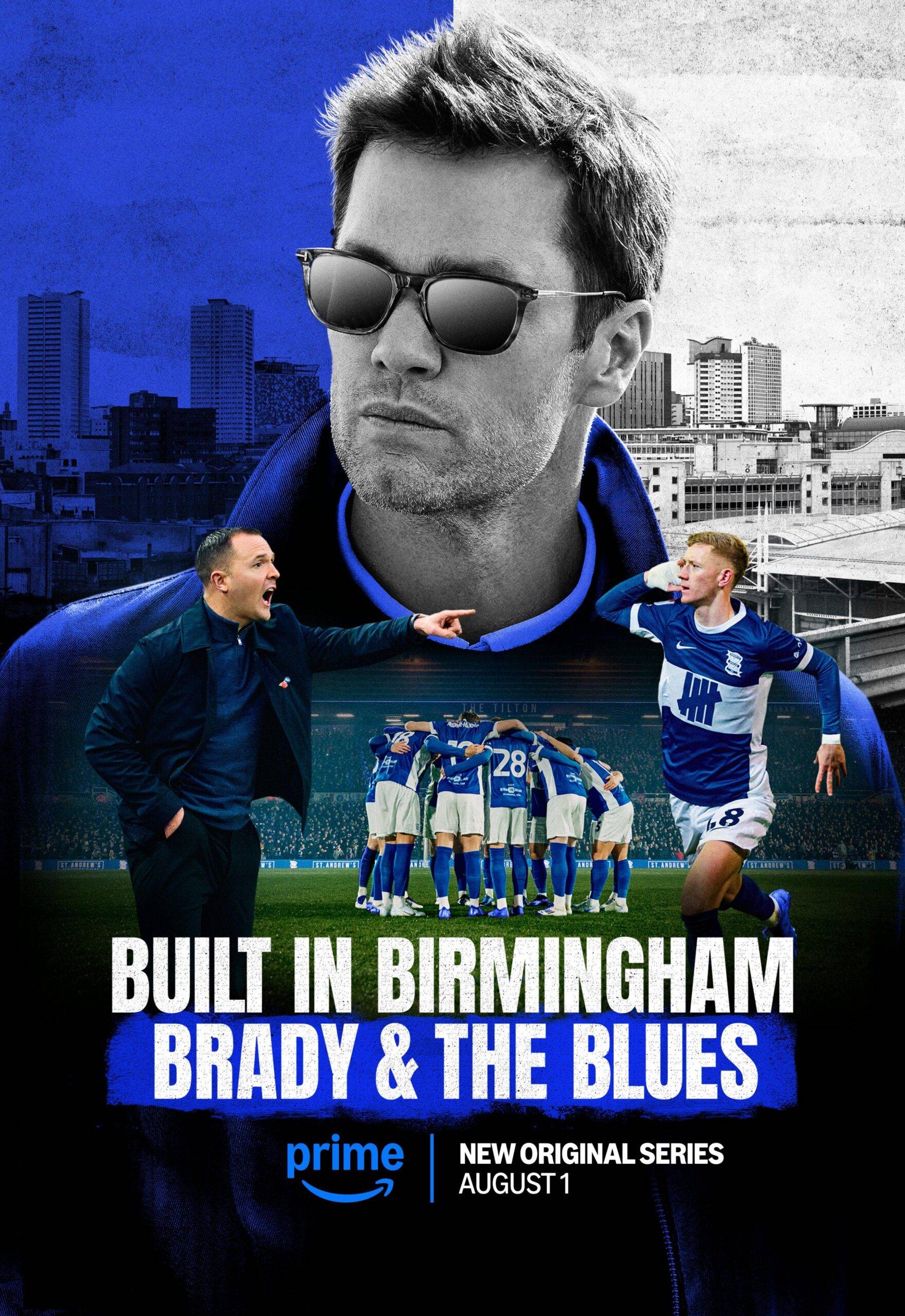I guess the first thing to note about the Amazon Prime documentary is that it really isn’t for Blues fans per se, but for new fans.
The bottom-line reason for Built In Birmingham – Brady & The Blues is to generate more interest in and get more eyes on the club, not least in America.
It’s not especially a fly-on-the-wall documentary series, either. To be honest, opening your doors and allowing film crews carte blanche to pick over a basket case, as happened in Sunderland ‘Til I Die on the odd occasion, is great for us the viewer, but no self-respecting or self-aware, professionally run club would allow such.
The closest we get are a few snippets on transfer deadline day, with an impatient Craig Gardner pacing up and down and Tom Wagner pensive in the ‘War Room’ at the Henley-in-Arden training ground.
There’s no rows or set-tos caught on camera, Garry Cook’s departure was not touched upon and whilst it would have been enlightening to see board-level conversations about Wayne Rooney and the subsequent managerial recruitment strategy, that was never going to happen in truth.
However, the five-episode series is nonetheless an enjoyable peep behind the curtain, if you love the Blues, are just curious about the club or what Tom Brady is up to.
And as he’s an all-American icon and sporting superstar, plenty across the pond are bound to tune in.
Well crafted, the documentary tells a tale using sit down interviews, human interest stories (surprisingly, Lukas Jutkiewicz’s was not featured) and the pull of Brady.
Sure, the narrative for the rest of the world is akin to how the NFL’s greatest Brady and his mate ‘Wags’ set about turning around an under-achieving sleeping giant, with its history of heartache, relegations, whilst throwing in a dollop of hooliganism and neat Peaky Blinders references, and focusing on Blues self-deprecating fanbase from a proud, hard-working industrial city.
“It’s like Cleveland or Cincinnati – hardcore,” says Brady of Brum.
Blues relegation is a handy scene-setting start point in episode one for the reset and how Brady, Wagner et al go about realising errors and changing, as Wagner says, ‘every single element of the organisation’.
Executive producer Steven Knight’s part is key. He knits it all together expertly by providing context for the casual viewer and non-Blues fan in an avuncular way, through his conversations to camera.
It’s not a Welcome To Wrexham, sugar-laden whimsy; this is more hard-nosed but with lighter and emotional moments, too.
And whilst the knockabout banter with the Dragons’ Hollywood owners is good and piques interest, Blues often make it clear, unashamedly, that their ambition and end game is completely different to Wrexham’s.
Brady himself is fascinating. The clips you see in isolation, with him dropping F bombs and telling a Peterborough social media troll to ‘suck on that’, paint a stereotypical picture that might provide confirmation bias for some.
However, there’s more layers to him than I realised and of course he is all about winning, proper process and high performance, but he is also empathetic.
The part where he talks about making himself available to Davies, for example. “The coach doesn’t want to be left on an island. I can be his confidante, encouraging, pushing (him).”
The dynamic between Brady and Davies is fascinating. Clearly, Brady sees something of himself in the Blues manager. And the respect is mutual.
Brady suggests he watches thought-provoking interviews with fabled American football coach Nick Saban, about transactional and transformational coaching. Davies assimilates and filters it in the way he delivers his message to players.
The scenes between Brady and Rooney are stiff and uncomfortable. Through his eyes and instinct, Brady susses that all is not well.
Contrast to his interactions with Davies – ‘kindred spirits’ – and Wagner comments that Davies has a ‘real competitive ire’, as we know Brady does.
It certainly seems that Brady possesses a major influence in matters – maybe more than we realised – and is not simply playing at it, in his role as minority investor.
The face he pulls when Wagner tells him Garry Cook feels it’s a ‘faux pas’ presenting guest David Beckham with a ‘swag bag’ at the Wrexham home game is telling. And Brady’s logic is correct. “Make people feel so special they’ll have an emotional interest in the club. They’ll want to go on the journey with you.”
What also strikes is that the documentary shows how Wagner and Brady become increasingly emotionally invested in the club as the months tick by.
In the opening episode, Wagner admits that after talks with a Premier League club went nowhere (Spurs), he couldn’t pass up the Blues opportunity to ‘make some money’.
By the time it’s episode four and Wagner is hunkered on the away terrace at Wrexham, when Blues are not at their best, he shouts like an agitated fan at the players: “F****** run!”. Blues are under his skin all right.
Davies admits he is a workaholic and when kit and equipment manager Chris Shute is asked to describe him, he replies with a half-smile: “Intense. Intense.”
The scenes of Davies with his family are touching and make you realise how much a manager in this position, or probably rather this particular turbo-driven manager, sacrifices.
The defeat at Wembley in the Vertu Trophy Final gnaws away at both Wagner and Brady. Afterwards, Wagner talks about the need to succeed in the games that matter. And before that, in episode two, he comments: “You can’t just do well enough. To get silver in your hand, you have to win big games.”
Wagner, Brady, Davies are a triumvirate driving a change in mindset from the ‘ah, well, typical Blues’ to a winner’s mentality. They want higher standards and higher performance, with attendant results, to reach the highest peaks possible.
But let’s get back to the story telling of the documentary, not so much what we can glean as avid Blues aficionados.
The contribution of various fans hits the right note.
Octogenarians Pat Crowther and Mavis Stevens are wonderful. Steward Sam Pitt, who grew up in the shadow of St. Anderw’s, and daughter Alex are similarly engaging and natural. All contributors give the viewer and wider world a snapshot of who and what we are, and what Blues means to us.
Of course, there is a bit of over-egging some things – we see more of the rare defeats than the zillions of wins last season. But a series like this needs some jeopardy and drama, and how the protagonists respond and overcome. Our attention is more likely to be held by a fuming Davies snapping at the cameramen to ‘get out’ of the dressing room than rounds of back-slapping, for example.
To sum up, Made In Birmingham – Brady & The Blues is well done and projects an interesting story that a broader audience, perhaps potential investors and partners, may well be keen on following.
Where it ends is anyone’s guess – and that in itself is compulsive.
Wagner: “What people forget is that in Tom’s long playing career, he held everyone to a very high standard and drove a culture of winning and of excellence that changes outcomes.
“Yes, I am going to say and do some more dumb things. And yes, we are going to make mistakes and yes we’re going to lose matches. But no, we are never going to quit in pursuing our ultimate goal and our ultimate goal is to play at the highest level of football, period, full stop.”
As we journey on, let the next series begin . . .









